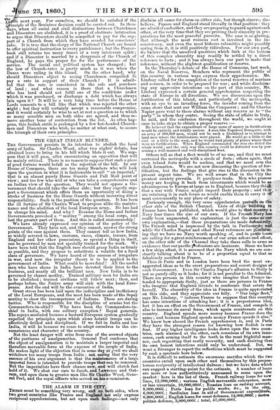THE GREAT INDIAN BLUNDER.
THE Government persists in its intention to abolish the local army of India. Sir Charles Wood, after two nights' debate, has obtained leave to bring in his bill which blots it out. We sup- pose that it will pass, after encountering an opposition that will be mainly critical. There is no reason to suppose that such a piece of good fortune would befall as the rejection of the bill. In our House of Commons, there are too many Members who will look
i upon the question n what it is fashionable to call "an imperial," that is an almost purely Horse Guards and Pall Mall point of view ; and too few who will or who can take a comprehensive and an Indian view of the question. They would not oppose a Go- vernment that should take the other side; but they eagerly sup- port a Government which offers them an opportunity of doing a stroke of business for the Horse Guards without incurring direct responsibility. Such is the position of the question. It has been the ill fortune of Sir Charles Wood to propose alike the mainte- nance and the abolition of the local European army. He has had to change his mind. And why ? Because the Home and Indian Governments provoked a " mutiny " among the local corps, and lost the greater part of them. And this is called statesmanship !
We have already expressed our opinion of the policy of the Government. They have not, and they cannot, answer the strong points of the ease against them. They cannot tell us how India, so widely severed in laws, customs, races, climate, tenure, from England and her other possessions,- so special a thing in itself, can be governed by men not specially trained for the work. We have been told that the English race should grasp India as firmly as possible, and they propose to substitute a volatile for a fixed class of governors. We have heard of the success of irregulars in war, and now the irregular theory is to be applied to the government of India. What could be more fatal! All the useful men who have shone in India have devoted their lives to the business, and nearly all the brilliant men. Now India is to be governed by chance medley. Trained military men for India are to be abolished ; trained civilians will follow next ; then, and perhaps before, the Native army will sink with the local Euro- peans. And the end will be the evacuation of India.
Great stress has been laid upon the indiscipline and inefficiency of the Local Europeans, and the most has been made of the Sepoy mutiny to show the incompetence of Indians. These are daring tactics. Who is responsible for the discipline of armies but the Commanders-in-chief? Who have been the Commanders-in- chief in India, with one solitary exception ? Royal generals. The sepoys mutinied because a bastard European system gradually expelled the principles upon which alone Asiatic troops can be effectively drilled and disciplined. If we fail in India and lose India, it will be because we cease to adapt ourselves to the cir- cumstances and character of the country. Not the least danger will arise from one of the avowed objects of the partisans of amalgamation. General Peel confesses that the object of amalgamation is to maintain a larger imperial and therefore moveable force at the expense of thc people of India. He makes light of the objection that in some day 'oi peril we shall withdraw too many troops from India ; not seeing that the very essence of his own argument is that the maintenance of a large imperial force is intended to provide troops that can be removed. But the imperialists have their chance now, and will clutch fast hold of it. We shut our ears to Jacob, and Lawrence and Out- ram, and open them to greater men like Sir Charles Wood, Gene- ral Peel, and the royal officers who served on his enumission.


























 Previous page
Previous page